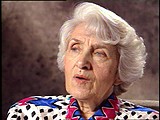
Oral History
Browse an alphabetical list of survivors’ oral histories. These interviews describe firsthand accounts and personal experiences during the Holocaust and World War II.
<< Previous | Displaying results 26-50 of 52 for "Oral History" | Next >>
-
Belle Mayer Zeck describes the size and influence of IG Farben
Oral HistoryBelle Mayer trained as a lawyer and worked for the General Counsel of the US Treasury, Foreign Funds Control Bureau. This bureau worked to enforce the Trading With the Enemy Act passed by Congress. In this capacity, Mayer became familiar with the German I. G. Farben chemical company, a large conglomerate that used slave labor during World War II. In 1945, Mayer was sent as a Department of Treasury representative to the postwar London Conference. She was present as representatives from the Allied nations…
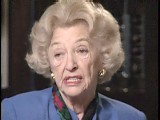
-
Belle Mayer Zeck describes working conditions and staffing at Nuremberg during the postwar trials
Oral HistoryBelle Mayer trained as a lawyer and worked for the General Counsel of the US Treasury, Foreign Funds Control Bureau. This bureau worked to enforce the Trading With the Enemy Act passed by Congress. In this capacity, Mayer became familiar with the German I. G. Farben chemical company, a large conglomerate that used slave labor during World War II. In 1945, Mayer was sent as a Department of Treasury representative to the postwar London Conference. She was present as representatives from the Allied nations…
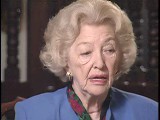
-
Belle Mayer Zeck reflects upon people who have dedicated their lives to the cause of human rights
Oral HistoryBelle Mayer trained as a lawyer and worked for the General Counsel of the US Treasury, Foreign Funds Control Bureau. This bureau worked to enforce the Trading With the Enemy Act passed by Congress. In this capacity, Mayer became familiar with the German I. G. Farben chemical company, a large conglomerate that used slave labor during World War II. In 1945, Mayer was sent as a Department of Treasury representative to the postwar London Conference. She was present as representatives from the Allied nations…
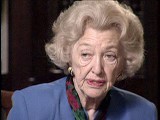
-
Belle Mayer Zeck reflects upon the sentences given to leaders of the economy
Oral HistoryBelle Mayer trained as a lawyer and worked for the General Counsel of the US Treasury, Foreign Funds Control Bureau. This bureau worked to enforce the Trading With the Enemy Act passed by Congress. In this capacity, Mayer became familiar with the German I. G. Farben chemical company, a large conglomerate that used slave labor during World War II. In 1945, Mayer was sent as a Department of Treasury representative to the postwar London Conference. She was present as representatives from the Allied nations…
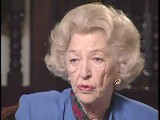
-
Benjamin (Ben) Meed describes the burning of the Warsaw ghetto during the 1943 ghetto uprising
Oral HistoryBen was one of four children born to a religious Jewish family. Germany invaded Poland on September 1, 1939. After the Germans occupied Warsaw, Ben decided to escape to Soviet-occupied eastern Poland. However, he soon decided to return to his family, then in the Warsaw ghetto. Ben was assigned to a work detail outside the ghetto, and helped smuggle people out of the ghetto—including Vladka (Fagele) Peltel, a member of the Jewish Fighting Organization (ZOB), who later became his wife. Later, he went into…
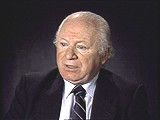
-
Benjamin (Ben) Meed describes Warsaw after the German occupation in 1939 and first experiencing antisemitism
Oral HistoryBen was one of four children born to a religious Jewish family. Germany invaded Poland on September 1, 1939. After the Germans occupied Warsaw, Ben decided to escape to Soviet-occupied eastern Poland. However, he soon decided to return to his family, then in the Warsaw ghetto. Ben was assigned to a work detail outside the ghetto, and helped smuggle people out of the ghetto—including Vladka (Fagele) Peltel, a member of the Jewish Fighting Organization (ZOB), who later became his wife. Later, he went into…
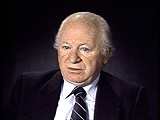
-
Benjamin (Beryl) Ferencz describes collecting evidence
Oral HistoryBen was born in a small village in the Carpathian Mountains of Transylvania in Romania. When he was an infant, his family moved to the United States. Ben attended Harvard University, where he studied criminal law. Ben graduated from Harvard University Law School in 1943. He joined a US anti-aircraft artillery battalion that was training in preparation for an Allied invasion of western Europe. At the end of World War II in Europe, Ben was transferred to the war crimes investigation branch of the US Army. He…
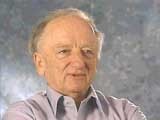
-
Benjamin (Beryl) Ferencz describes collecting evidence against alleged war criminals
Oral HistoryBen was born in a small village in the Carpathian Mountains of Transylvania in Romania. When he was an infant, his family moved to the United States. Ben attended Harvard University, where he studied criminal law. Ben graduated from Harvard University Law School in 1943. He joined a US anti-aircraft artillery battalion that was training in preparation for an Allied invasion of western Europe. At the end of World War II in Europe, Ben was transferred to the war crimes investigation branch of the US Army. He…
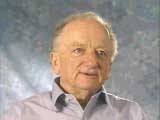
-
Benjamin (Beryl) Ferencz describes collecting evidence of death marches
Oral HistoryBen was born in a small village in the Carpathian Mountains of Transylvania in Romania. When he was an infant, his family moved to the United States. Ben attended Harvard University, where he studied criminal law. Ben graduated from Harvard University Law School in 1943. He joined a US anti-aircraft artillery battalion that was training in preparation for an Allied invasion of western Europe. At the end of World War II in Europe, Ben was transferred to the war crimes investigation branch of the US Army. He…
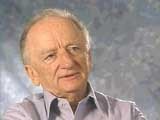
-
Benjamin (Beryl) Ferencz describes early war crimes investigations
Oral HistoryBen was born in a small village in the Carpathian Mountains of Transylvania in Romania. When he was an infant, his family moved to the United States. Ben attended Harvard University, where he studied criminal law. Ben graduated from Harvard University Law School in 1943. He joined a US anti-aircraft artillery battalion that was training in preparation for an Allied invasion of western Europe. At the end of World War II in Europe, Ben was transferred to the war crimes investigation branch of the US Army. He…
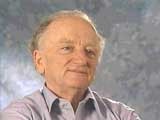
-
Benjamin (Beryl) Ferencz describes evidence collected at the Mauthausen camp
Oral HistoryBen was born in a small village in the Carpathian Mountains of Transylvania in Romania. When he was an infant, his family moved to the United States. Ben attended Harvard University, where he studied criminal law. Ben graduated from Harvard University Law School in 1943. He joined a US anti-aircraft artillery battalion that was training in preparation for an Allied invasion of western Europe. At the end of World War II in Europe, Ben was transferred to the war crimes investigation branch of the US Army. He…
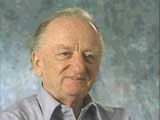
-
Benjamin (Beryl) Ferencz describes how he became involved in preparations for the Subsequent Nuremberg Proceedings
Oral HistoryBen was born in a small village in the Carpathian Mountains of Transylvania in Romania. When he was an infant, his family moved to the United States. Ben attended Harvard University, where he studied criminal law. Ben graduated from Harvard University Law School in 1943. He joined a US anti-aircraft artillery battalion that was training in preparation for an Allied invasion of western Europe. At the end of World War II in Europe, Ben was transferred to the war crimes investigation branch of the US Army. He…
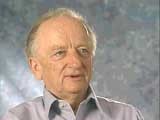
-
Benjamin (Beryl) Ferencz describes preparations for trials before military tribunals
Oral HistoryBen was born in a small village in the Carpathian Mountains of Transylvania in Romania. When he was an infant, his family moved to the United States. Ben attended Harvard University, where he studied criminal law. Ben graduated from Harvard University Law School in 1943. He joined a US anti-aircraft artillery battalion that was training in preparation for an Allied invasion of western Europe. At the end of World War II in Europe, Ben was transferred to the war crimes investigation branch of the US Army. He…
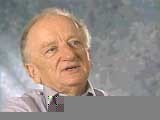
-
Benjamin (Beryl) Ferencz describes taking testimony from witnesses while collecting evidence of war crimes
Oral HistoryBen was born in a small village in the Carpathian Mountains of Transylvania in Romania. When he was an infant, his family moved to the United States. Ben attended Harvard University, where he studied criminal law. Ben graduated from Harvard University Law School in 1943. He joined a US anti-aircraft artillery battalion that was training in preparation for an Allied invasion of western Europe. At the end of World War II in Europe, Ben was transferred to the war crimes investigation branch of the US Army. He…
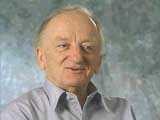
-
Benno Müller-Hill, Antje Kosemund, Paul Eggert, and Elvira Manthey describe the Euthanasia Program
Oral HistoryBenno Müller-Hill, professor of genetics at the University of Cologne and the author of Murderous Science, describes the Nazi "Euthanasia" Program, with oral history excerpts from Antje Kosemund, Paul Eggert, and Elvira Manthey. Antje Kosemund had a disabled younger sister who was admitted to Alsterdorf Institute, Hamburg, December 1933, at the age of three and was subsequently killed in 1944. Paul Eggert was a resident of the orphanage section of the Dortmund-Applerbeck institution from 1942-43 where he…
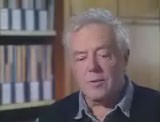
-
Benno Müller-Hill discusses genetics and eugenics
Oral HistoryBenno Müller-Hill, professor of Genetics, University of Cologne, and author of Murderous Science, discusses genetics and eugenics. [Photo credits: Getty Images, New York City; Yad Vashem, Jerusalem; Max-Planck-Institut für Psychiatrie (Deutsche Forschungsanstalt für Psychiatrie), Historisches Archiv, Bildersammlung GDA, Munich; Bundesarchiv Koblenz, Germany; Dokumentationsarchiv des österreichischen Widerstandes, Vienna; Kriemhild Synder: Die Landesheilanstalt Uchtspringe und ihre Verstrickung in…
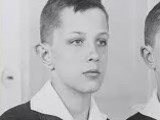
-
Beno Helmer describes conditions in the Lodz ghetto
Oral HistoryAs a young man, Beno used his foreign language skills to land small movie roles. He and his family were deported to the Lodz ghetto, where they struggled daily to find food. In the underground, Beno became an expert at derailing trains. The family was sent to Auschwitz and was separated. All but Beno and one sister, whom he found after the war, died. Beno survived a series of camps and later helped to track war criminals.
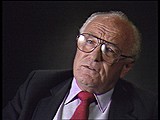
-
Blanka Rothschild describes antisemitic regulations in occupied Lodz, Poland
Oral HistoryBlanka was an only child in a close-knit family in Lodz, Poland. Her father died in 1937. After the German invasion of Poland, Blanka and her mother remained in Lodz with Blanka's grandmother, who was unable to travel. Along with other relatives, they were forced into the Lodz ghetto in 1940. There, Blanka worked in a bakery. She and her mother later worked in a hospital in the Lodz ghetto, where they remained until late 1944 when they were deported to the Ravensbrueck camp in Germany. From Ravensbrueck,…
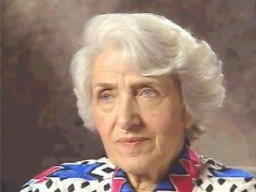
-
Blanka Rothschild describes arrival at the Ravensbrück camp
Oral HistoryBlanka was an only child in a close-knit family in Lodz, Poland. Her father died in 1937. After the German invasion of Poland, Blanka and her mother remained in Lodz with Blanka's grandmother, who was unable to travel. Along with other relatives, they were forced into the Lodz ghetto in 1940. There, Blanka worked in a bakery. She and her mother later worked in a hospital in the Lodz ghetto, where they remained until late 1944 when they were deported to the Ravensbrueck camp in Germany. From Ravensbrueck,…
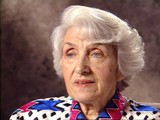
-
Blanka Rothschild describes conditions in the Ravensbrück camp
Oral HistoryBlanka was an only child in a close-knit family in Lodz, Poland. Her father died in 1937. After the German invasion of Poland, Blanka and her mother remained in Lodz with Blanka's grandmother, who was unable to travel. Along with other relatives, they were forced into the Lodz ghetto in 1940. There, Blanka worked in a bakery. She and her mother later worked in a hospital in the Lodz ghetto, where they remained until late 1944 when they were deported to the Ravensbrueck camp in Germany. From Ravensbrueck,…
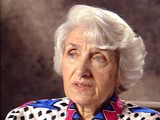
-
Blanka Rothschild describes deportations from the Lodz ghetto
Oral HistoryBlanka was an only child in a close-knit family in Lodz, Poland. Her father died in 1937. After the German invasion of Poland, Blanka and her mother remained in Lodz with Blanka's grandmother, who was unable to travel. Along with other relatives, they were forced into the Lodz ghetto in 1940. There, Blanka worked in a bakery. She and her mother later worked in a hospital in the Lodz ghetto, where they remained until late 1944 when they were deported to the Ravensbrück camp in Germany. From Ravensbrueck,…
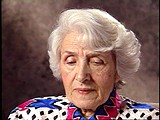
-
Blanka Rothschild describes forced labor in the Ravensbrück camp
Oral HistoryBlanka was an only child in a close-knit family in Lodz, Poland. Her father died in 1937. After the German invasion of Poland, Blanka and her mother remained in Lodz with Blanka's grandmother, who was unable to travel. Along with other relatives, they were forced into the Lodz ghetto in 1940. There, Blanka worked in a bakery. She and her mother later worked in a hospital in the Lodz ghetto, where they remained until late 1944 when they were deported to the Ravensbrueck camp in Germany. From Ravensbrueck,…
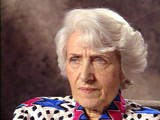
-
Blanka Rothschild describes returning to Lodz after the war to look for family members
Oral HistoryBlanka was an only child in a close-knit family in Lodz, Poland. Her father died in 1937. After the German invasion of Poland, Blanka and her mother remained in Lodz with Blanka's grandmother, who was unable to travel. Along with other relatives, they were forced into the Lodz ghetto in 1940. There, Blanka worked in a bakery. She and her mother later worked in a hospital in the Lodz ghetto, where they remained until late 1944 when they were deported to the Ravensbrueck camp in Germany. From Ravensbrueck,…
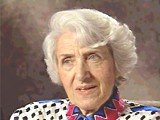
-
Blanka Rothschild describes the beginning of the German invasion of Poland when she and her family were in Lodz
Oral HistoryBlanka was an only child in a close-knit family in Lodz, Poland. Her father died in 1937. After the German invasion of Poland, Blanka and her mother remained in Lodz with Blanka's grandmother, who was unable to travel. Along with other relatives, they were forced into the Lodz ghetto in 1940. There, Blanka worked in a bakery. She and her mother later worked in a hospital in the Lodz ghetto, where they remained until late 1944 when they were deported to the Ravensbrueck camp in Germany. From Ravensbrueck,…
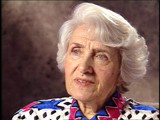
-
Blanka Rothschild describes the role of sharing and friendship in surviving the Lodz ghetto
Oral HistoryBlanka was an only child in a close-knit family in Lodz, Poland. Her father died in 1937. After the German invasion of Poland, Blanka and her mother remained in Lodz with Blanka's grandmother, who was unable to travel. Along with other relatives, they were forced into the Lodz ghetto in 1940. There, Blanka worked in a bakery. She and her mother later worked in a hospital in the Lodz ghetto, where they remained until late 1944 when they were deported to the Ravensbrueck camp in Germany. From Ravensbrueck,…
